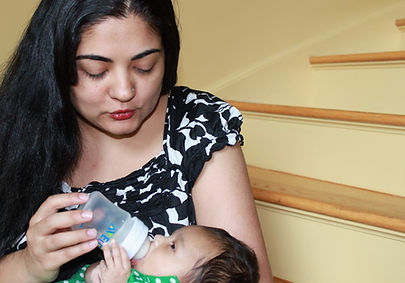
Published in...
Featured Reader at...



WIFE!
Guernica Special Issue:
The Boundaries of Language fiction
When the unwanted children turned into solar panels, they gathered along the two-lane billboard-free highways in clusters between dairy farms. When the children first disappeared their squeaks entered into the clouds. We are hesitant to admit we miss the cacophony, as we chew gluten-free bread in their absence, noticing the scattered coteries of solar panels.

We Hate Daddy's Girlfriends
Liar's League fiction
Mommy is a feminist. Daddy says he is a feminist too. Mommy says Daddy says that as part of his “game.” Mommy said she was going to be a better feminist, and not talk so much relationships with men. Daddy says Mommy needs a filter with her thoughts. Mommy says Daddy needs a filter with parading his girlfriends.

My Grandmother Spoke to Tigers
Chicago Quarterly Review fiction
I always knew my body was broken. It was confirmed back in London, four days before the wedding, which happened to fall during the week of Princess Diana’s funeral.
There I was, I lying on a gynecological table for the first time in my life—legs clenched, in a chair, with metal stirrups at the end. My heart raced. My stomach rumbled. My intestines churned. Dr. Amin, a short, bespectacled woman, said, “It says on your form that you are here because you are interested in birth control.”
“I’m getting married on Saturday,” I said.

Indexing A Life
Asian American Writers' Workshop Essay
Every artist has a creation story. Dayanita Singh’s mother, Nony, lived in a mausoleum of files inherited from her husband upon his death, files filled with figures about wheat yields and other agricultural indexes, files that were the air to ignite the flames of lawsuits—until she stopped. If I could, I would ask the artist, do you have photographs of your mother’s files? Are any of them here on the walls?
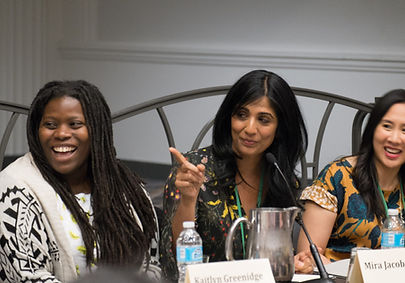
At Grubstreet Writers of Color Roundtable
LitHub Essay
One of the most anticipated events on Friday was the “Writers of Color Roundtable,” inspired by the current conversations around the lack of diversity in publishing. At the Roundtable were agent Regina Brooks, writers Alexander Chee, Kaitlyn Greenidge, Mira Jacob, Jennifer De Leon, and Celeste Ng, editor Emi Ikkanda and moderator Sonya Larson.
Author Interview with Janine Joseph
The Rumpus interview
That semester, I woke up at 4 a.m. once a week—the only time I’d permit myself to write (that semester) at all. It was helpful to compartmentalize and allow myself only one day a week to be right back into the thick of my undocumented past. I should mention that, by this time, I had been a legal resident for less than a year so I was still in a period of transition.
More than compartmentalizing my various lives, that specific semester-long writing practice, I think, also helped to regulate the emotions I felt daily when I was undocumented. The speaker of my poems is often anxious, alarmed, or afraid, and the energy of the poems became manifestations of those emotional states.

Diwali, Once Hidden, Now Lit Large
The New York Times essay
When my 3-year-old daughter told me that she needed something special for Share Day at camp — a sari and a candle dish used for Diwali, the Hindu New Year — I felt surprised and thrilled, and maybe even a little envious. Her pleasure in wearing Indian clothes and celebrating holidays as a young child is very different from what I experienced in my own childhood.
When my family and I emigrated in 1977, we didn’t yet know what it meant to be Indian-American. I was raised in upstate New York, among only a handful of South Asian-Americans. As a kid I desperately sought to fit in with the dominant Caucasian community, yet my obviously different name, identity, culture, religion and dark skin made that impossible.
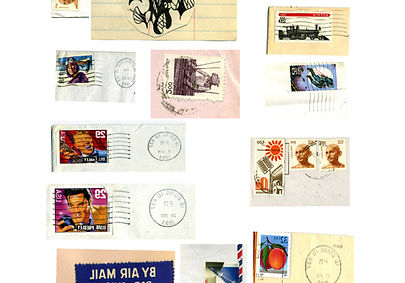
The End of Love (Letters)
Bloom essay
I must sound nostalgic. In fact, I am deeply nostalgic. These letters, these notes, even the faxes, were objects to hold, smell, caress, lick, fold, unfold, and cherish. The urgency in the letters was an urgency of emotion…
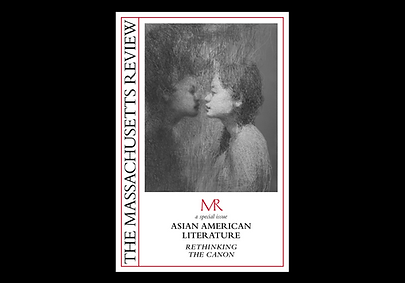
Sex, Death, & Social Stationery
Massachusetts Review essay
Imagine me at the not-very-sweet age of sixteen, receiving an aerogram from this boy, while he was away for the summer. Imagine his letters, the “y” in the name of my street, looking like the tail of a hanging cat onto the next line, followed by a similar “g” in my town’s name, as he visited his family in the country we both called home. I prayed he would one day profess his love for me, as I imagined him sitting, finding a pen, thinking of words, writing my name, writing my home address, posting it in a letter.
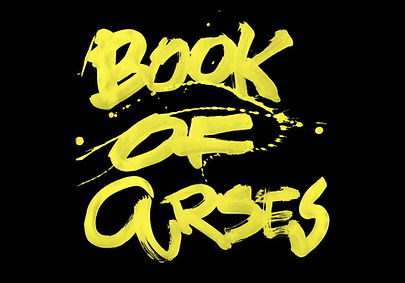
Curse on Sensitive Guy
You—Conscious Man, Mr. Woke Progressive Intersectional Feminist Man. You—at Take Back the Night, Women’s March, HashtagMeToo. You rehearse active listening, call other dudes mansplainers. Sharing languages, customs, skin hue, politics, you say when you are with us, you are home. You tell us that we are so much better than other girls from our community, and we feel special, but you really insulted us all...
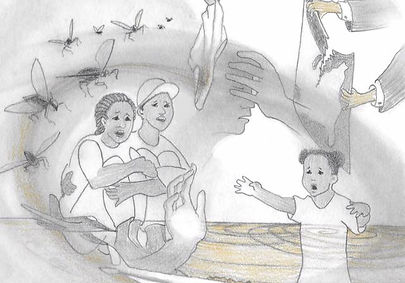
Nightmares During Trump
special edition book flash essay
And then He came. The Leader covered the glass with a curtain, the curtain became a wooden fence, the wooden fence became a cement wall. I could no longer see my child. I could no longer pack her lunch. I had no idea if she was beyond the cement wall. I kicked the wall, I screamed her name, they grabbed my arms. I screamed I am a citizen, and asked them to look at my naturalization certificate. They pushed me to the ground, they stripped me….
My Ugly Granddaughter

The Offing fiction
Please help my ugly granddaughter. After the good-for-nothing-fiancé left her, she started exercising with her red boxing gloves at her gymnasium. I tell her, Good, since you will be alone, it’s best that you learn to fight. She gives me a long look and stays quiet, and I know she understands. She is too picky. When she was little, she only liked moong dal. She wouldn’t eat the masoor, toor, or channa dal — can you imagine how difficult it was for me? And now, she complains, “this man said this while I was walking,” “this man touched me on the train,” I wonder — did you ask these men if they are married? What their profession is? Do they have a spousal dental plan with teeth whitening?

Creation Stories in Nurrudin Farah's "Hiding in Plain Sight"
Apogee essay
The very freedom Farrah embodies by writing about war, female circumcision, designer jeans, and art, is reflected in Bella, a self-actualized female character….While geopolitics looms in the background, the novel is filled with extraordinarily domestic scenes including dishwashing, meal preparation, grocery shopping, leaving voicemails, getting stuck in traffic, unpacking suitcases, and throwing a dinner party.



Renewable Energy
Duende poem
When the unwanted children turned into solar panels, they gathered along the two-lane billboard-free highways in clusters between dairy farms. When the children first disappeared their squeaks entered into the clouds. We are hesitant to admit we miss the cacophony, as we chew gluten-free bread in their absence, noticing the scattered coteries of solar panels.
Author Interview with Indra Novey
The Rumpus interview
I don’t think there’s anything quite like “ever” in other languages. It’s like embora in Portuguese, which was a word that plays an essential role in Ways to Disappear. When you say to someone in Brazil, “vou embora,” it basically means “I’m going out.” You’re not telling them where you’re going, and you’re not telling them when you’re going to be back. In English, we expect more information when someone leaves the house, even if that information is false.
SAMAR essay
Since I was a young girl, when I looked at images of civil rights and Vietnam War protestors, I felt the aura from a time when art, politics and war were on the forefront of people’s everyday lives, when hair length and dress meant something more than fashion. I especially loved that era in the black and white photographs of my parents, my dad’s mutton chops and bellbottoms, loving the fashion, but knowing the story that he once got arrested and spent a night in jail—a story he doesn’t like to tell, but one his children want to hear. And of course, I loved the fonts….


Skokie Nights
Jaggery fiction
The desire for death, for Rimi, had nothing to do with suicide. She didn’t want to kill herself. She didn’t hate her life. She was bored—bored of Skokie, of cheese fries at Greek-owned-and-operated Dengeo’s, of Beverly Hills 90210, of the New Kids on the Block, of pot, of Navratri parties, of Sweet Sixteens, of lab reports, of standardized tests….
Author Interview with Chitali Sen
The Rupmus interview
I was always making up stories in my head. I would ask my sister to play “movie” with me, a game I invented in which we each stare at a blank wall for a minute, pretending to watch a movie, and then we turn to each other and tell what the movie was about. I think she indulged me once or twice. As an adolescent, it seemed I was the only one in my family who wasn’t busy. I kept myself occupied by daydreaming, reading, and writing.
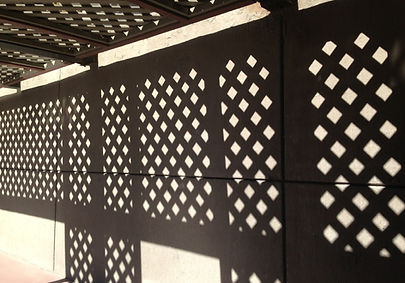
Love911 essay
The sun shined that day, the sky the color of a robin’s egg, the air smelled of back-to-school. The night before, the office supply stores had lines around the corner for mothers to buy two-pocket folders, the teachers to buy plastic boxes from crayons and pick up stacks of photocopied worksheets. When summer bleeds into fall, when people wear sweaters, shorts, sandals and boots. And I was outside, and we were outside. How could we be inside?....



The Weeklings essay
A better mother would have an easier or shorter labor. A better mother would have cut her losses and had a C-section early. A better mother would have chosen a home birth with a midwife instead of a hospital delivery. A better mother would not be absolutely terrified of home birth, even with a midwife. A better mother would not have been terrified of childbirth…
Mister Beller's Neighborhood essay
When I imagined having a baby, I pictured leisurely days, with lots of snuggles and mouth-wiping. I didn’t have a clue. I used to judge parents who “outsourced” their childcare to a paid stranger—not having any understanding of how modern families really work…

